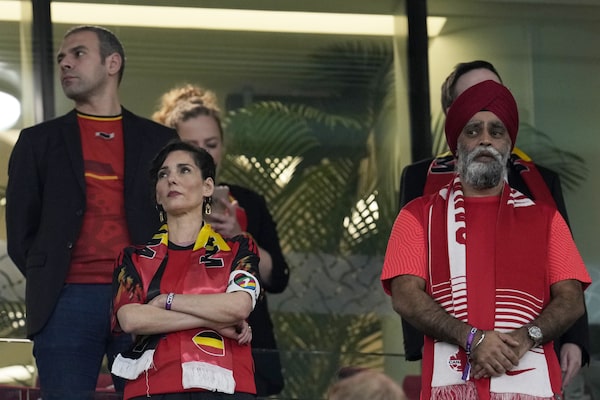
Minister of International Development Harjit Sajjan, right, watches the World Cup match between Belgium and Canada in Doha, Qatar, Nov. 23, 2022. At left is Belgian Foreign Affairs Minister Hadja Lahbib.Natacha Pisarenko/The Associated Press
International Development Minister Harjit Sajjan was instructed to lobby on behalf of one of Canada’s leading military equipment manufacturers ahead of his visit to Qatar for the 2022 FIFA World Cup, a briefing document reveals.
Mr. Sajjan met with Qatari Foreign Affairs Minister Sheikh Mohammed bin Abdulrahman Al-Thani, a member of the emirate’s ruling family, in November. The briefing document prepared for Mr. Sajjan by Global Affairs Canada references a deal apparently in the works between London, Ont.-based General Dynamics Land Systems (GDLS) and the Qatar Armed Forces.
In a section titled “Key Messages,” Mr. Sajjan is told to communicate to Mr. Al-Thani that Ottawa is pleased that “GDLS is interested in working with the Qatari Military for the supply of light-armoured vehicles (LAVs) as well as other opportunities.”
“This partnership would bring Canada and Qatar significant benefits,” the document continues. We “sincerely hope to see this opportunity for co-operation between our countries realized.”
Another section says one of the objectives of the meeting is to demonstrate “Canada’s interest in doing more with Qatar bilaterally,” including in the field of defence.
Representatives of GDLS were also expected to take part in a roundtable discussion with Mr. Sajjan, organized by the Canadian Business Council Qatar, ahead of his meeting with Mr. Al-Thani, the document says.
The briefing document was first reported on by online publication The Maple, which acquired it through an access to information request. It follows reporting by The Globe and Mail last year exposing how Canada was poised to sell more arms to Qatar despite the intense scrutiny the World Cup brought to the emirate’s human-rights record.
Mr. Sajjan was briefed on human-rights issues, according to partially redacted sections of the document, but they were not on the agenda for his meeting with Mr. Al-Thani, now Qatar’s Prime Minister. After being criticized during his trip for not commenting on the emirate’s mistreatment of migrant workers and its anti-LGBTQ policies, Mr. Sajjan tweeted that he had engaged in “constructive dialogue” with unnamed Qatari officials on the issues.
During his time in Qatar, Mr. Sajjan also met with representatives of the International Labour Organization (ILO), a United Nations body that was instrumental in securing certain reforms to the emirate’s labour laws ahead of the World Cup, such as abolishing the “kafala” employment system, which tied workers to their employers.
A spokeswoman for Global Affairs, Genevieve Tremblay, said Ottawa “does not comment on private commercial activity.” She said Mr. Sajjan’s “engagement with Qatari officials would have encompassed all elements of Canada’s bilateral relationship with Qatar, including trade and investment opportunities for Canadian companies.”
Criticism of Qatar’s treatment of migrant workers and LGBTQ people intensified last August, 100 days out from the tournament.
That month, Canada added Qatar to the Automatic Firearms Country Control List (AFCCL), which regulates the weapons and military equipment that can be sold to a given country. That move did not have to be approved by Parliament and attracted little media or political scrutiny at the time.
A section of the briefing document on “defence and security opportunities” notes the emirate’s addition to the AFCCL, adding, “Qatar’s Armed Forces are engaged in a force modernization program to develop comparable capabilities to Western nations, especially for purposes of multinational deployments and interoperability.”
Qatar has invested heavily in its military in recent years, with arms imports up 227 per cent in the period spanning 2017 through 2021 over the previous four years, according to the Stockholm International Peace Research Institute (SIPRI).
After The Globe’s report in December, NDP foreign affairs critic Heather McPherson said her party was “very concerned” by Qatar’s addition to the AFCCL.
“The Liberal government has been hypocritical of arms sales and human rights for years,” she said. “While successive ministers of foreign affairs under the Liberal government have said they will deny permit applications where there is a substantial risk of human-rights violations, they have ignored ample evidence of these violations.”
Non-lethal Canadian military equipment has previously been exported to Qatar, including LAVs. But multiple experts who spoke to The Globe said the emirate’s addition to the AFCCL was likely indicative of a deal similar to that which led to the creation of the list in the first place: the sale of LAVs equipped with large-calibre automatic weapons to Saudi Arabia.
That deal involved GM Defense, which would eventually be sold and become GDLS. Andrea Brown, a spokeswoman for GDLS, declined to comment for this story, advising The Globe to contact the Qatari government “regarding their defence programs.”
While scrutiny of the weapons trade often focuses on their use in war, Kelsey Gallagher, a researcher at Project Ploughshares and a leading expert on Canadian arms sales, warned that, “by arming these despotic regimes to the teeth, we’re absolutely upholding autocracy around the world.”
“Without the ability to procure huge amounts of weapons systems, these regimes wouldn’t have the same ability to crack down on dissent,” he said.
Ms. Tremblay, the Global Affairs spokeswoman, said “permits will not be issued if there is a substantial risk that they could be used to commit or facilitate a serious violation of international human rights law.”
 James Griffiths
James Griffiths